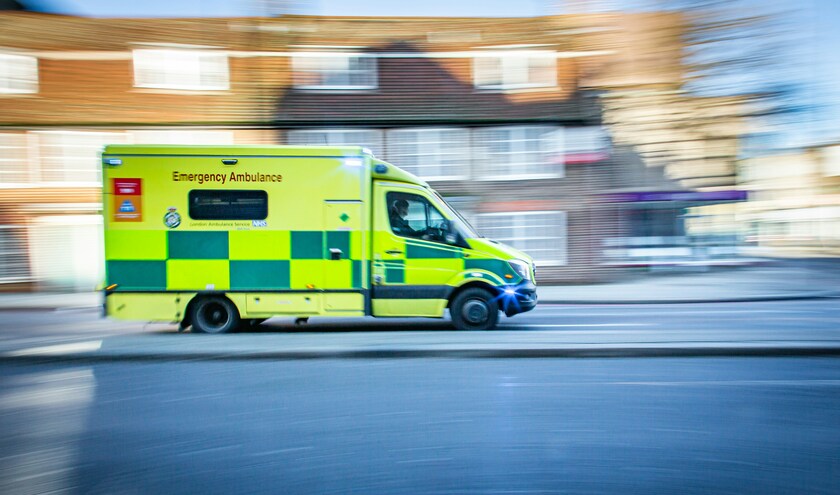In the survey of over 45,500 service users, the majority of urgent treatment centre (UTC) respondents were positive with 80% feeling listened to by doctors and nurses, and 76% saying they had enough time to discuss their condition and treatment.
A&E respondents were less positive with 60% reporting doctors or nurses had completely explained their condition or treatment and over a quarter (28%) saying this only happened ‘to some extent' and 11% not at all.
Over a third of people (38%) who had attended a Type 1 department and over half (54%) of people who had visited a Type 3 department rated their overall experience as nine or higher out of 10.
The picture for individual services such as ambulance handovers, waiting times and pain management was less favourable.
Of the 27% of survey respondents who arrived at A&E by ambulance, 61% said they were handed over to A&E staff within 15 minutes, but 17% reported waiting more than an hour. Over a quarter of Type 1 patients (28%) waited over an hour to be assessed by a nurse or doctor after arriving at A&E and 47% said they were not able to get help with their condition or symptoms while waiting.
For those waiting in A&E only 26% were informed how long they would have to wait to be examined or treated. Notably, 64% of patients said they waited more than four hours to be admitted, transferred or discharged at A&E. Patients whose visit lasted more than four hours reported worse than average experiences for all areas of care analysed.
Of those attending a Type 3 department who had a pre-booked appointment, 64% were assessed within the 30-minute target. However, not everyone surveyed had an arranged appointment and almost one in five (19%) of these said they waited more than an hour to be seen.
For people who needed help with medications for a pre-existing medical condition while in the department, over a quarter of urgent treatment centre respondents (26%) and a similar proportion of A&E respondents (28%) said they did not receive that help.
Less than half of people attending either an A&E (42%) or an urgent treatment centre (47%) who needed help with pain relief thought that staff ‘definitely' helped them control their pain. Over a quarter in both Type 1 (27%) and Type 3 (26%) services said they were not given any help with pain relief.
While two-thirds of people discharged from A&E (67%) said they were given information on how to care for their condition at home, a third (33%) said they were not. One in five (21%) of people discharged from an A&E department said that they were not told who to contact if they were worried about their condition or treatment after leaving A&E. Of those respondents who felt they needed a conversation about any further health or social care after leaving A&E, 31% said staff did not discuss it with them, but they would have liked them to. And of those who tried to contact any health and social care services after leaving A&E, 28% said they were not available when needed.
Younger people aged 16-35 were more likely to report a negative experience of urgent and emergency care services as were patients with a disability, and frail patients (A&E only). Frail and disabled patients reported worse experiences with regards to being listened to and were less likely to feel they were treated with respect and dignity while in A&E.
Responses this year indicate that not being able to get a GP appointment quickly enough and wanting to be seen on the same day were both factors directly influencing people's decisions to seek treatment at a UEC service. Of those who went directly to A&E, 20% went because they thought their GP practice would not be able to help (UTC 21%), and 26% wanted to be seen on the same day (UTC 34%). Of those who contacted another service, over a third contacted a GP (36%; UTC 48%), but 28% of those said the practice did not provide the help they needed (UTC 44%).
Reaction
Saffron Cordery, deputy chief executive, NHS Providers, said: ‘Many hospitals, mental health, community and ambulance services face huge financial and operational challenges every day. We have just seen a record number of the most urgent ambulance call outs - 37% more than pre-pandemic - and the most 999 calls of any month this year, on top of a record number of A&E attendances in the past year.
‘This year's early winter has made its mark on many parts of the NHS and the extra demand it brings will make it hard to maintain progress on reducing discharge delays and waiting times but trusts continue to work flat out to see patients as quickly as possible.'
Tim Gardner, assistant director of policy at the Health Foundation, said: ‘The new Government has emphasised the depth of the crisis it inherited and has committed significant investment to stabilise the NHS in its recent Budget. To drive improvement, the Government will need to provide practical support and resources to improve care across the health and care system, backed by long-term investment and reform in next year's Spending Review and 10-Year Health Plan. Importantly, the challenges facing the NHS will not be addressed without fixing social care.'
An NHS spokesperson said: 'While staff are continuing to innovate to improve A&E waiting times in the face of rising demand and constrained capacity, there is no doubt that too many people are spending too long in emergency departments, and not receiving the quality of care that we would all want to see.
‘As we head into what is likely to be another challenging winter, local teams are doing everything possible to ensure that those who need it can access the safest possible care in the right place for them - and as usual we are asking the public to help us help you by getting their free NHS Covid, flu and RSV vaccinations if they're eligible, and using NHS111 through the NHS app, online or on the phone for urgent but not life-threatening issues.
‘In the longer term we know part of the solution lies in providing more care and support in the community to help people avoid A&E altogether, and that is one of the key themes we are seeking views from the public on now as we work with the Government on the 10-Year Plan for Health.'
Health minister Karin Smyth said: ‘We inherited a broken NHS that for too long has failed patients and left hard-working staff battling outdated systems and technology.
‘We will turn this around, starting with the £26bn investment made in the Budget and the reforms we are making so every penny of extra investment is well spent.
‘We're hiring an extra 1,000 GPs to fix the front door to the NHS and, having resolved the resident doctors' strikes, this is the first winter in three years that all NHS staff will be on the front line, not the picket line.
‘Our 10-Year Plan will deliver the fundamental reforms needed to turn the NHS on its head and make it fit for the future.'



